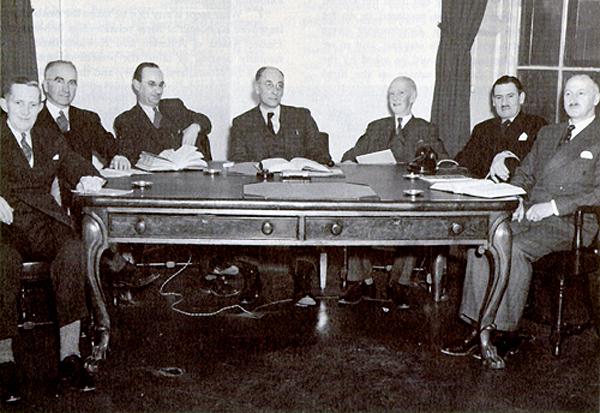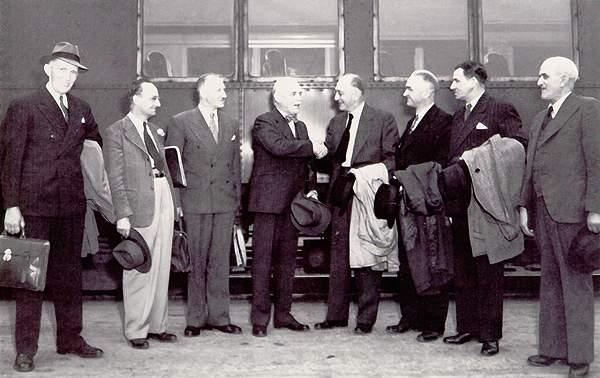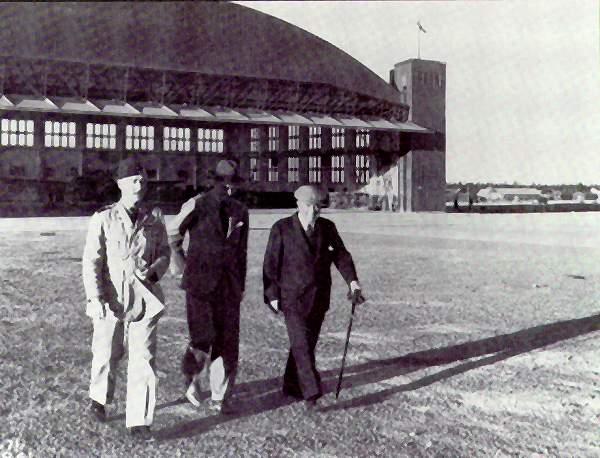The Ottawa Delegation, 1947
The members of the Ottawa delegation were Gordon Bradley (chairman), J.R. Smallwood, Thomas Ashbourne, the Rev. Lester Burry, Gordon Higgins, Charles Ballam and P.W. Crummey. The majority favoured confederation. Talks began on 24 June, 1947.


The confederate strategy was to stay in Ottawa as long as it took to obtain clear and generous draft terms of union. The Canadian government, however, was at first reluctant to negotiate. First, Newfoundland would demand special financial arrangements which, if granted, could upset Ottawa's financial relations with the existing provinces. Second, how could the government negotiate with a delegation which did not represent Newfoundland in any official sense? In the end, after intense lobbying, the federal cabinet overcame its reservations and on 18 July agreed to negotiate.
Anti-confederates in the delegation and in St. John's tried to stop the talks going ahead. They felt that by negotiating, the delegation was exceeding its terms of reference. Bradley rebuffed all attempts to make the delegation return to Newfoundland, and draft terms were substantially agreed by mid-August.
At this point, proceedings were nearly derailed by the death of Frank Bridges, the New Brunswick representative in the cabinet. The Prime Minister, W.L. Mackenzie King, insisted that his government could not make a final decision on the terms until New Brunswick was again represented. This placed the delegation in a difficult position. It could not return home empty-handed; but it could not stay in Ottawa any longer. On 30 September the delegation left for St. John's, carrying the record of their meetings, information on the Canadian federal system, and a letter promising that the cabinet would make a decision as soon as possible.

Anti-confederate anger exploded in the Convention when it reconvened on 10 October. Smallwood introduced the delegation's report, stating that the draft terms would arrive later. Then A.B. Butt stood up to give notice of a motion of no confidence in Bradley as chairman. Bradley cut him off, announced his resignation, and strode from the chamber.
By the time the Convention began to debate the delegation's report, the draft terms had arrived from Ottawa. Canada would assume most of the public debt, and Newfoundland could retain its accumulated surplus of some $29 million. Canada would provide certain subsidies, negotiate a tax agreement, and pay a special 12 year transition grant. The terms outlined which services and departments would be taken over by the federal government, and guaranteed continued employment for Newfoundland civil servants. The education clause continued the denominational school system, but allowed for amalgamation. There was no special fisheries clause.
During the debate, Smallwood made sure that all his listeners, in the chamber and to the radio broadcast, understood each and every item, stressing the advantages of the Canadian system. The Canadian high commissioner described Smallwood's performance as "an amazing spectacle" - "one man ... dominating by the sheer force of personality and a wide and accurate knowledge of Dominion-Provincial relations, the whole discussion. The debate ... must have been of very considerable propaganda value." Thanks to Smallwood, and to Bradley, the confederate strategy had worked. The Anglo-Canadian gamble seemed to be paying off.




